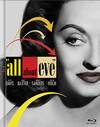





It's a Wonderful Life (1946)
Cast | Crew | Awards | Articles | Lyrics | Bibliography | Downloads | Links | Image Credits
| Article 1 |
Christmas classic had an unpromising startby Bob ThomasThe Associated Press, July 3, 1997Mushy and improbable, it was anything but a blockbuster when it reached the theaters at Christmastime in 1946. Now "It's a Wonderful Life" is a holiday classic -- and one big reason Americans are fondly mourning James Stewart almost as a relative, even young people who are just seeing his movies for the first time. Probably no other film has appeared on television more -- partly because the copyright was inadvertently allowed to lapse for many years, partly because people enjoy seeing it again and again because it's uplifting. Both Stewart and director Frank Capra said the movie saved their careers. Both served in World War II for five years, an eternity to be absent from the screen. Back from the war, Capra co-founded Liberty Pictures to escape studio control, but he was having trouble finding projects. Finally the head of RKO Studios showed Capra a story that Phillip Van Doren Stern had written as a Christmas card. It was called "The Greatest Gift." Capra read the few typewritten pages. "It was the story I had been looking for all my life!" he wrote in his 1971 biography, "The Name Above the Title." "A good man, ambitious. But so busy helping others, life seems to pass him by. Despondent. He wishes he had never been born. He gets his wish. Through the eyes of a guardian angel he sees the world as it would have been had he not been born. Wow! What an idea." Stewart made that man George Bailey -- honest, decent, generous to a fault, driven to the verge of suicide when his dotty uncle loses a wad of cash he's supposed to deposit for the family savings and loan. It's the stuff of a thousand video clips -- from the moment the angel Clarence Odbody stops a hollow-eyed Stewart from jumping off a snow-covered bridge to the finale when Stewart and his adoring wife, played by Donna Reed, are joined by the simple townspeople of mythical Bedford Falls, N.Y., singing "Auld Lang Syne" around a Christmas tree. The movie ends with perhaps the most famous line in the film, when his youngest daughter, the impish Zuzu, says, "Look, Daddy: Teacher says that every time a bell rings, an angel gets its wings." Stewart had returned to his MGM contract after the war, but the studio had found no projects for him. He leaped at the chance to work with Capra again (they had paired on "Mr. Smith Goes to Washington" and "You Can't Take It With You"). Free of studio control, Capra spent lavishly. The total was $3.78 million, a huge budget in those postwar days. RKO hurried the film into December release to qualify for the Academy Awards. Unfortunately for Capra, his partner (and rival) William Wyler had made "The Best Years of Our Lives," which was released at the same time. "Best Years" captured the reviews, the business and the Academy Awards. "Practically all the actors involved behave as cutely as pixies," sniffed The New Yorker, saying "Wonderful Life" was "so mincing as to border on baby talk." The movie collected only $3.3 million at the box office, compared with $11.3 million for "Best Years." Capra, Stewart and the picture were nominated for Oscars. They lost to Wyler, Fredric March and "Best Years." Not until television made "It's a Wonderful Life" available to all Americans would Capra find the vindication he so desperately wanted. He died in 1991. The film's copyright lapsed in 1973, 27 years after it was issued, because then-owner NTA failed to apply for a renewal. Two decades and countless TV showings later, NTA's successor, Republic Pictures Corp., regained control of the film's rights and began charging royalties. So it's seen less often now but remains a Christmastime classic. One of the movie's biggest fans is Steven Spielberg, who once told Capra he takes a copy of " It's a Wonderful Life" on his film locations. "I show it to the cast and crew," Spielberg said, "and I tell them, 'This is the kind of picture I hope we can make."' © 1997 The Associated Press |
|
Article 1 |
Article
2 |
| Now in Print! |
|---|
| Now on DVD! |
|---|
Buy Videos & DVDs |
|
Buy Movie Posters |
|
Buy Movie Posters |
|
Classic
Movie Merchandise |
|
![]() Printer-friendly version.
Printer-friendly version.
![]() Return
to the top.
Return
to the top.
Last updated:
March 10, 2011.
Reel Classics is a registered trademark of Reel Classics, L.L.C.
© 1997-2011 Reel Classics, L.L.C. All rights reserved. No
copyright is claimed on non-original or licensed material.
Terms of
Use.









